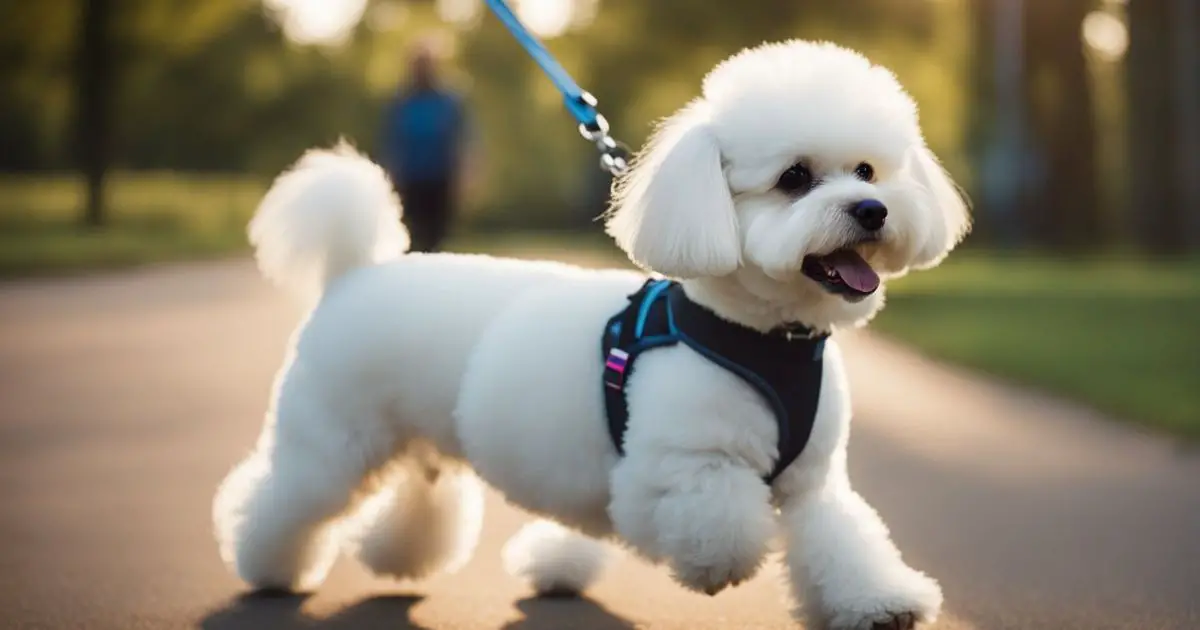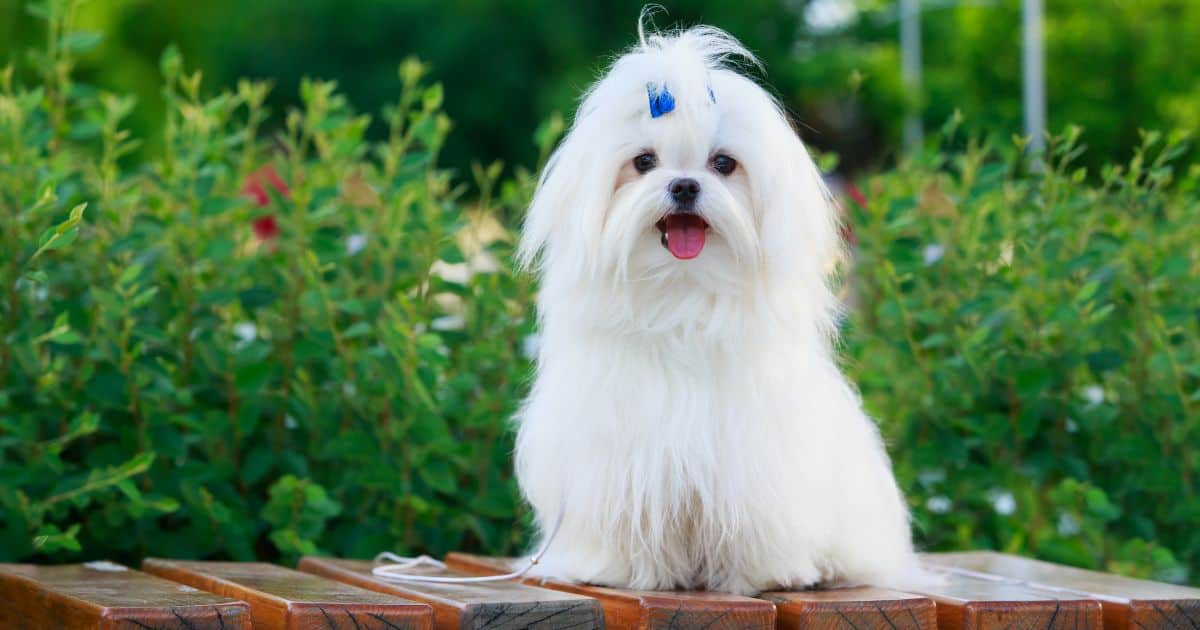Table of Contents
Does Bichon Bark a Lot?
If you’re considering getting a Bichon Frise, you may be wondering if this breed is prone to excessive barking. The short answer is yes, Bichons have a tendency to bark more than some other breeds. However, this doesn’t mean that all Bichons are constant barkers or that excessive barking can’t be managed.
Understanding Bichon Frise Vocalization
Bichons are known for being vocal dogs, and barking is just one of the ways they communicate. They may also growl, whine, and make other noises to express themselves. Some Bichons are more vocal than others, and some may bark more in certain situations than others.
The Bichon Frise Breed and Barking
Bichons were originally bred as companion dogs, and their small size and friendly personalities make them popular pets today. However, their tendency to bark can be a challenge for some owners. It’s important to understand the reasons why Bichons bark and how to manage their vocalization to ensure a happy and healthy relationship between you and your furry friend.
Key Takeaways
- Bichon Frises are known for being vocal dogs and may bark more than other breeds.
- Understanding the reasons why Bichons bark and how to manage their vocalization is key to a happy and healthy relationship between you and your furry friend.
- With proper training and management, excessive barking can be controlled in Bichon Frises.
Understanding Bichon Frise Vocalization
Does Bichon bark a lot? The answer is yes, they do. Barking is a natural form of communication for dogs, and Bichons are no exception. However, excessive barking can be a problem, especially if it disturbs the neighbors or causes anxiety for the dog owner.
There are several reasons why Bichon Frise dogs may bark. One of the most common reasons is communication. Dogs bark to express their needs and emotions. For example, your Bichon may bark to let you know that they need to go outside, or they may bark to greet you when you come home.
Another reason why Bichons may bark is to alert their owners to potential dangers. Bichons are naturally curious and alert dogs, and they may bark to warn their owners of strangers or unfamiliar sounds.
Finally, anxiety can also be a cause of excessive barking in Bichons. Separation anxiety is a common problem among dogs, and Bichons are no exception. If your dog barks excessively when you leave the house, they may be experiencing separation anxiety.
To prevent excessive barking, it’s important to understand why your Bichon is barking in the first place. If your dog is barking to communicate their needs, make sure they have everything they need, such as food, water, and a comfortable place to sleep. If your dog is barking to alert you to potential dangers, make sure to investigate the source of the noise or the stranger. If your dog is barking due to anxiety, consider working with a professional dog trainer or behaviorist to help your dog overcome their anxiety.
In conclusion, Bichon Frise dogs do bark a lot, but excessive barking can be a problem. By understanding the reasons why your Bichon is barking, you can take steps to prevent excessive barking and ensure that your dog is happy and healthy.
The Bichon Frise Breed and Barking
If you’re considering getting a Bichon Frise, one of the things you may be wondering is whether they bark a lot. The short answer is yes, Bichons are known for their vocalization. But why is this the case?
Bichons were originally bred as companion dogs, and they are known for being affectionate and sociable. However, this also means that they can be prone to separation anxiety and may bark when left alone for long periods. Additionally, Bichons have a strong prey drive and may bark at squirrels, birds, or other animals they see outside.
It’s important to note that while Bichons do bark, excessive barking can be a sign of underlying issues such as anxiety or boredom. Proper training and socialization can help to minimize barking behavior.
In terms of breed traits and temperament, Bichons are a small breed that is typically hypoallergenic, making them a popular choice for those with allergies. They are also known for being playful and intelligent, and they generally get along well with children and other pets.
When it comes to the history of the Bichon Frise breed, they are believed to have originated in the Mediterranean region and were popular among French and Spanish royalty in the 16th century. The breed was recognized by the American Kennel Club in 1972.
While Bichons are often compared to the Maltese breed, they have some distinct differences in terms of appearance and temperament. Bichons have a slightly larger and more robust build than Maltese dogs, and they are generally more outgoing and sociable.
In summary, if you’re considering getting a Bichon Frise, it’s important to be aware of their tendency to bark. Proper training and socialization can help to minimize excessive barking behavior, and overall, Bichons are a playful and affectionate breed that can make great companions for the right owner.
Bichon Frise Bark Triggers and Management
If you are a Bichon Frise owner, you may have noticed that your furry friend barks more than other dogs. But why do Bichons bark so much? Let’s explore some common triggers and situations that can cause Bichon Frise dogs to bark excessively.
Triggers
Bichons are known to bark at strangers, noises, and other dogs. They may also bark when they are feeling anxious, stressed, or fearful. If your Bichon barks at everything and anything, it may be a sign of an underlying issue that needs to be addressed.
Anxiety and Stress
Bichons can suffer from separation anxiety, which can cause them to bark excessively when left alone. They may also bark when they are feeling stressed or anxious. To manage anxiety and stress, make sure your Bichon gets plenty of exercise and mental stimulation. You may also want to consider crate training or hiring a dog walker to help break up their day.
Environment
Your Bichon’s environment can also play a role in their barking behavior. If they are left alone for long periods of time, they may become bored and bark out of boredom. If they are not getting enough attention or socialization, they may bark to get your attention. Make sure your Bichon has plenty of toys and treats to keep them occupied and spend quality time with them every day.
Management
If your Bichon is barking excessively, it is important to address the issue before it becomes a problem. Here are some tips for managing your Bichon’s barking behavior:
- Train your Bichon to be quiet on command.
- Use positive reinforcement to reward good behavior.
- Avoid punishing your Bichon for barking, as this can make the problem worse.
- Consider using a bark collar or citronella spray collar as a last resort.
Remember, excessive barking can be a sign of an underlying issue, so if your Bichon’s barking behavior is causing problems, it is important to consult with a veterinarian or a professional dog trainer.
Training Your Bichon Frise to Bark Less: Tips and Techniques
If your Bichon Frise barks excessively, it can be frustrating for both you and your neighbors. Fortunately, with proper training, you can teach your furry friend to bark less and be more controlled. Here are some tips and techniques to help you achieve that:
Positive Reinforcement Training

Positive reinforcement is a training technique that involves rewarding your dog for good behavior. This method is effective in reducing excessive barking because it encourages your Bichon Frise to be quiet when they hear the “quiet” command. When your dog stops barking, reward them with treats, praise, or cuddles.
Obedience Training
Obedience training is an effective way to teach your Bichon Frise to obey commands. This training involves teaching your dog basic commands such as sit, stay, come, and quiet. When your dog learns these commands, they will be more obedient, which can help reduce excessive barking.
Quiet Command
The “quiet” command is an essential tool in training your Bichon Frise to bark less. When your dog barks excessively, say “quiet” in a firm, but calm voice. When your dog stops barking, reward them with treats, praise, or cuddles. With consistent training, your dog will learn to associate the “quiet” command with being quiet.
Commands and Training

Consistency is key when it comes to training your Bichon Frise to bark less. Use the same commands and techniques every time your dog barks excessively. With time and patience, your dog will learn to respond to your commands, and excessive barking will become a thing of the past.
In conclusion, training your Bichon Frise to bark less is possible with the right techniques and patience. Positive reinforcement training, obedience training, and the “quiet” command are effective tools in reducing excessive barking. With consistency and patience, your furry friend will learn to bark less and be more controlled.
Are Bichon Frise Good Watchdogs? Exploring Their Alert Barking
If you’re considering getting a Bichon Frise, you may be wondering if they make good watchdogs. The answer is yes! Bichons are known for their alert barking, which makes them great at warning their owners of potential danger.
But what exactly is alert barking? It’s when a dog barks to alert their owner of something unusual or suspicious. This is different from unnecessary barking, which is when a dog barks for no apparent reason. Bichons are not known for unnecessary barking, so you don’t have to worry about them disturbing the peace.
Bichons are not guard dogs or protective dogs, but they do make great watchdogs. They are not aggressive and will not attack intruders, but their barking alone is often enough to deter them. Bichons are also great at alerting their owners to visitors, deliveries, or anything else out of the ordinary.
It’s important to note that alert barking can become a problem if it’s excessive or if the dog is barking at everything. This can be a sign of anxiety or boredom and should be addressed with proper training and exercise.
In summary, Bichon Frises are great watchdogs due to their alert barking. They are not aggressive and will not attack intruders, but their barking alone is often enough to deter them. Make sure to properly train and exercise your Bichon to prevent excessive barking.
Controlling Excessive Barking: Effective Training and Management Strategies
If your Bichon Frise barks excessively, it can be frustrating for both you and your neighbors. Fortunately, there are several training and management strategies that can help control excessive barking.
Positive Reinforcement Techniques
Positive reinforcement techniques can be highly effective in training your Bichon Frise to bark less. These techniques involve rewarding your dog for good behavior, such as not barking when it normally would.
When your dog barks excessively, try distracting it with a toy or treat. Once it stops barking, give it praise and a reward. Over time, your dog will learn that not barking is a good thing and will be more likely to stop barking when asked.
Desensitization
Desensitization is another effective training technique that can help reduce excessive barking. This technique involves exposing your dog to the things that trigger its barking in a controlled and safe environment.
For example, if your dog barks at other dogs, you can gradually introduce it to other dogs in a controlled setting. Start by introducing it to one dog at a time and gradually increase the number of dogs. Over time, your dog will become desensitized to other dogs and will be less likely to bark at them.
Management Strategies
In addition to training techniques, there are several management strategies that can help control excessive barking. These strategies involve managing your dog’s environment to minimize the things that trigger its barking.
One effective management strategy is to limit your dog’s exposure to outside stimuli, such as people and other dogs. You can do this by keeping your dog inside when people or other dogs are around, or by using curtains or blinds to block your dog’s view of the outside.
Another effective management strategy is to provide your dog with plenty of exercise and mental stimulation. A tired and mentally stimulated dog is less likely to bark excessively.
By using a combination of training and management strategies, you can help control excessive barking in your Bichon Frise and enjoy a more peaceful home environment.
Common Misconceptions About Bichon Frise and Barking
When it comes to Bichon Frise, there are a lot of misconceptions about their barking tendencies. Let’s take a look at some common myths and set the record straight.
Myth #1: Bichon Frise Don’t Bark
It’s a common misconception that Bichon Frise doesn’t bark. While they may not be as vocal as some other breeds, they are still capable of barking. In fact, Bichons are known to be alert and protective of their owners, which means they may bark when they sense a threat or danger.
Myth #2: Bichon Frise Bark Excessively
While Bichon Frise are capable of barking, it’s important to note that they don’t bark excessively. In fact, excessive barking is not a common behavior for this breed. However, like any dog, Bichons may bark more than usual if they are not properly trained or socialized.
Myth #3: Bichon Frise Cannot be Trained to Stop Barking
This is simply not true. Bichon Frise can be trained to stop barking just like any other dog. The key is to start training early and be consistent with your approach. Positive reinforcement training methods work well with this breed, and it’s important to reward good behavior and ignore bad behavior.
Myth #4: Bichon Frise Only Bark When They Are Alone
While Bichon Frise may bark more when they are alone, they are also capable of barking when they are with their owners. As mentioned earlier, Bichons are alert and protective of their owners, which means they may bark when they sense a threat or danger.
In conclusion, Bichon Frise are capable of barking, but they don’t bark excessively. With proper training and socialization, Bichons can be trained to stop barking and be well-behaved companions.
Bichon Frise Owners Share Their Experiences
If you’re considering getting a Bichon Frise as a family pet, you might be wondering if they bark a lot. While every dog is different, we reached out to some Bichon Frise owners to get their personal experiences with their dogs’ barking habits.
One owner, Sarah, says that her Bichon Frise, Charlie, does bark, but only when he’s trying to communicate something important. For example, if he needs to go outside or if he’s feeling anxious about something. She says that overall, Charlie doesn’t bark excessively and is a great companion for her family.
Another owner, Tom, says that his Bichon Frise, Daisy, does bark quite a bit, especially when she’s excited. However, he’s found that socializing with other dogs and people has helped to reduce her barking. Daisy is a very social dog and loves to be around people, so Tom takes her to the dog park and on walks to help her burn off energy and interact with others.
Overall, it seems that Bichon Frise can bark, but it really depends on the individual dog and their behavior. Socialization and training can also play a big role in reducing excessive barking. If you’re considering getting a Bichon Frise, it’s important to do your research and talk to other owners to get a better understanding of what to expect.
FAQs
What is the typical barking behavior of Bichon Frise?
Bichon Frise is a small breed of dog that is known for being friendly, playful, and affectionate. They are also known for their tendency to bark, which is a natural behavior for dogs. Bichon Frise may bark to alert their owners of danger, to communicate with other dogs, or to express their emotions.
Is Bichon Frise known for excessive barking?
While Bichon Frise is known for barking, they are not necessarily known for excessive barking. However, some Bichon Frise may bark more than others due to their temperament, personality, or environment. It is important to understand that excessive barking can be a sign of anxiety, stress, or other underlying health issues.
What are the reasons why Bichon Frise bark?
Bichon Frise may bark for various reasons, including boredom, anxiety, fear, territorial behavior, or attention-seeking behavior. It is important to identify the underlying cause of barking to address the behavior effectively.
How can I train my Bichon Frise to bark less?
To train your Bichon Frise to bark less, you can start by identifying the triggers that cause them to bark. Once you have identified the triggers, you can use positive reinforcement techniques to teach them alternative behaviors. For example, you can reward your dog for being quiet or for responding to a command such as “quiet” or “stop barking.”
What are some effective ways to prevent Bichon Frise from barking?
Some effective ways to prevent Bichon Frise from barking include providing them with enough exercise and mental stimulation, avoiding triggers that cause them to bark, using positive reinforcement techniques to teach them alternative behaviors, and using anti-bark collars or devices as a last resort.
Does Bichon Frise bark more than other small dog breeds?
While Bichon Frise is known for barking, they do not necessarily bark more than other small dog breeds. However, it is important to understand that each dog is unique and may have different barking behaviors due to their personality, temperament, or environment.




Leave a Reply
You must be logged in to post a comment.